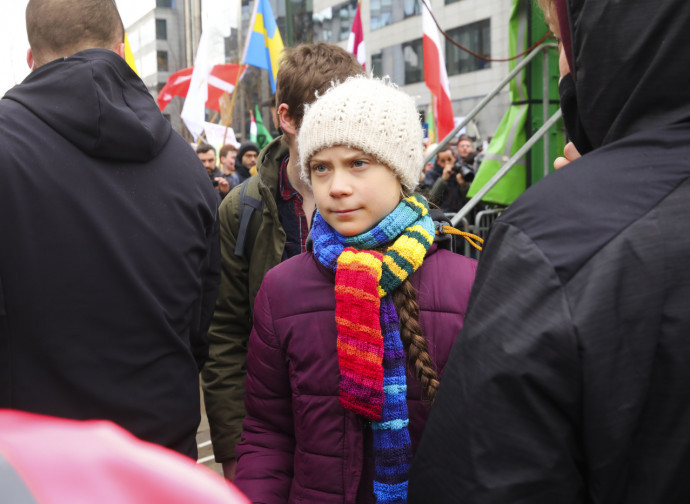Covid-19 frees Europe of its ecological illusions
The coronavirus crisis and the deadly realism it’s subjecting us to, is forcing Timmermans and von der Leyen to put their feet firmly back on the ground and privilege human and economic survival over expensive and ambitious plans that aim to achieve ecological utopia. Much of the Green New Deal will now be postponed to better times.

The coronavirus crisis and the deadly realism it’s subjecting us to, is forcing Timmermans and von der Leyen to put their feet firmly back on the ground and privilege human and economic survival to the enticements of Pied-piper Greta and her admiring followers.
According to a draft document published by Euractiv, in order to "release capacity" for action and intervention, the EU executive is preparing an updated work program for 2020, which is expected to be published on April 29. With regards to the Green Deal, the Commission would evaluate the following among the fundamental and non-extendable initiatives:
- Renewed Sustainable Finance Strategy (non-legislative);
- 2030 Climate Target Plan (non-legislative, including impact assessment, third quarter 2020). However, due to the postponement of the UN climate conference in Glasgow (COP26), it could be delayed;
- Renovation wave' (non-legislative, 3rd quarter 2020); "The renovation wave of (industrial economic) could be a key element of any post-COVID recovery plan because of its benefits for stimulating economic activity," the document states, suggesting that timing will be maintained.
Among the initiatives probably delayed to next year there could be:
- The European Climate Pact (non-legislative);
- Review of the Non-Financial Reporting Directive;
- "Farm to Fork" strategy (reform of agricultural production, non-legislative);
- Offshore renewable energy (non-legislative);
- EU Biodiversity Strategy for 2030 (non-legislative);
- 8th Environmental Action Programm (legislative, article 192, paragraph 3, TFEU);
- Chemical strategy for sustainability (non-legislative);
- Strategy for sustainable and intelligent (non-legislative) mobility.
The other expensive Green Deal initiatives will certainly be postponed to 2021 or later, including:
- New EU Strategy on Adaptation to Climate Change (non-legislative) and New EU Forestry Strategy (non-legislative);
- Consumer empowerment initiatives for the ecological transition (legislative, including impact assessment, article 114 TFEU);
- ReFuelEU Aviation (Fuels for sustainable aviation (legislative, including impact assessment, article 100, paragraph 2, TFEU and / or article 12, paragraph 1, TFEU, Q4 2020) and FuelEU Maritime (Green European Maritime Space (legislative, incl Impact assessment, Article 100 (2) TFEU and / or Article 192 (1) TFEU, 4th quarter 2020).
The German troop in the European Parliament last week called for a 'relaxation' of the green program and a shift in the timing of the Green Deal agenda. Confirming the change of 'heart', in the first draft of Germany's European Presidency program, from next July, there are no concrete targets for the Green Deal, with new initiatives only in the hydrogen sector. The German Council Presidency should have been particularly ambitious in terms of environmental protection, but realism and pragmatism appear to have prevailed also in Berlin.
In addition to the hydrogen energy development program, in the only two pages of the forthcoming German presidency, the action plan on the closed management of waste and the cycle of substances to be disposed of is mentioned and the possibility of discussion on the renewal of the chemical sector. The document also notes that the Council will monitor the offshore wind strategy, which will be announced by the Commission, and will reach agreement on a European regulatory framework for joint wind farm construction projects. So far Timmermans' complaints seem to have had no effect, his letter written with Bertrand Piccard, the powerful head of the Solar Impulse Foundation, in which they ask which Europe you want for the 'post coronavirus' only makes you laugh for its complete unrealism and numerous pathetic phrases about the ideal environment and nature.
What Europe do we want for the post coronavirus epidemic? The answer is obvious, a Europe in which there is work, without European bureaucracy and where solidarity goes beyond the rights of robins to fly in a clean sky. The same 11 signatory countries (Austria, Denmark, Finland, Italy, France, Latvia, Luxembourg, Portugal, Holland, Spain and France) of the document in which the European Commission is asked to put the Green Deal back at the center of its initiatives, but only after the solution of the Covid pandemic crisis 19, is proof of the dramatic hypocrisy and inadequacy of the political leadership we are all suffering under. The pandemic brings us all back to realism, that of saving lives and health today and that of being able to start working again for our well-being and the future of our children tomorrow. Fireflies and sardines? Let Timmermans and Greta continue to toy around with those, in the meantime we are pleased Europe seems to have come back to life, even if it’s out of necessity rather than virtue.
